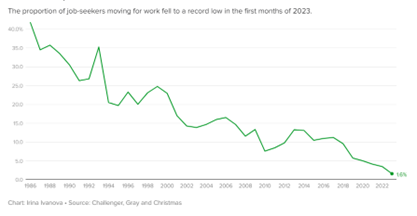
As creatures of habit, after more than three years of working in a hybrid or remote work environment, we’re now rather comfortable with this new norm. We’ve made the necessary amendments to allow our homes to seamlessly morph into multidisciplinary spaces of work, rest, and play, and we’ve reallocated the time previously reserved for our daily commute. Needless to say, we’ve developed new habits to align with our new work environment, so for many, relocating for an in-office position is less thrilling than it may have been pre-pandemic.
But there are even more factors contributing to a growing reluctance to relocate, including frenzied housing markets, spiking interest rates, and a rising cost of living in many major urban centers. So, how can companies appeal to and attract key talent with robust, magnetic mobility programs while also containing costs?
“Reluctance to Relocate” was the topic of our latest roundtable in Canada. Our advisory services team met with some top Canadian companies and uncovered some surprising twists in the world of talent acquisition and relocation. We were well-prepared to discuss the grim statistics of employee unwillingness to return to offices in general, and by extension, to relocate to work in offices in far-flung locations. But we were surprised by this level of noise matched with businesses reluctant to foot the cost of assignments and transfers.
Half the participants claimed that businesses are reluctant and risk-averse to relocation because of rising costs, lower business margins, and uncertainty around business trends. And quietly, some acknowledged that although senior leaders want their employees back in their cubes, employees continue to resist the commute, and for many industries, the work IS largely still getting done. This leads to another big question:
Why, in uncertain economic times, make the investment to move people?
This question triggered some lively conversation and mixed opinions among roundtable participants, with some foretelling gloom and doom ahead, and others who are more optimistic about the future of mobility.
We are currently in a phase of slowing relocation and assignment volumes; a trend that some expect to continue for another year or so. The silver lining? During this period, companies are leveraging RMC support for their highest echelons of talent and critical moves, prioritizing the strategy behind their programs and leaning on their partners for consultative support. But we can also expect to see more lump-sum programs incorporating AI-driven guided assistance, particularly as this technology is refined and made much more accessible.
What about the global housing market?
In the NY suburban metro area, as an example, new construction starts have been in play since before the pandemic and continue to grow at an astounding rate, but many of these projects won’t be complete for another two years. What’s more, is that a high rate of new construction projects are being designed for a less-settled demographic; renters versus long-term homeowners. It appears builders and planners are shifting away from the development of bedroom communities for families and commuters due to the increased uncertainty and volatility in the future of work. Not only how we work, but also where we work. This housing impermanence trend is evidence that so many people, companies, and industries are risk averse.
Are Businesses Thriving…or Just Surviving?
Another point of view is that businesses are still doing “well enough” and watching their costs, so they don’t feel the need to move people. According to CNN Business, despite the apparent end of the Great Resignation, the job market continues to hum along; the US economy added 339,000 jobs in May alone.

But a seemingly endless parade of mass layoffs among high-profile companies has created a skittishness, particularly among white-collar workers, said Jessica Kriegel, a workplace culture expert. The fact that quit rates are down indicates that there’s low confidence in the job market,” Kriegel said.
The Remote Debate Rages On
Remote work remains common, though it is losing popularity among employers. Nearly one in nine US job postings in May offered remote work, according to LinkedIn. Recent slower job growth and big companies pulling back on hiring coupled with widespread layoffs may lead to some pressure to return to the office, which includes accepting a position that requires relocation.
The hybrid workforce is not going to go away, but the situation where employees refuse to come to the workplace at all is not likely to hold.Johnny C. Taylor Jr
The group agreed on these top 10 reasons why people are reluctant to relocate:
- Language and Cultural Barriers and Adjustment
- Competing with Remote Work Options
- Support Systems
- Uncertain Employment & Career Opportunities
- Financial Impact Concerns
- Education System
- Healthcare Access
- Legal & Immigration Processes
- Social, Economic & Political Instability/Inequality
- Fear of Oppression Discrimination
Our roundtable debate bounced back and forth on many of the issues explored here, but participants all agreed on this point: When unemployment begins to rise a little, workers will likely feel they must go back to the office and that, in turn, will stimulate some relocation. In other words, we can take solace in the fact that Reluctance to Relocate is likely a phase that will pass. Until then, companies are wise to flex those creative muscles in developing “out of the box” solutions that will appeal to the modern employee. This may be in the form of intuitive mobility tech tools, wellness services, or flexible policy options – the sky is the limit!
We would love to hear from you –- what do you see as the top reasons for reluctance to relocate? Shoot us a note at solutions@weichertwm.com.